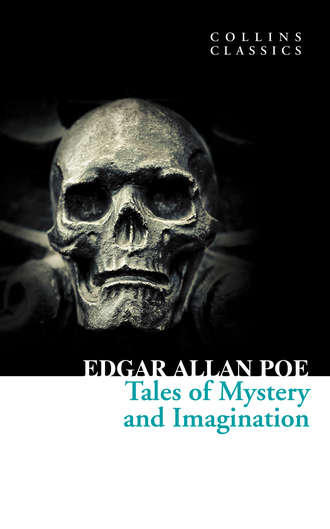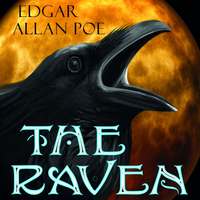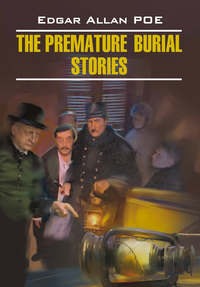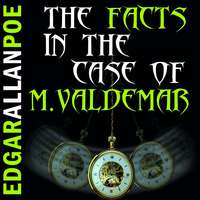
Полная версия
Tales of Mystery and Imagination
‘PS. [By Mr Ainsworth.]—The last nine hours have been unquestionably the most exciting of my life. I can conceive nothing more sublimating than the strange peril and novelty of an adventure such as this. May God grant that we succeed! I ask not success for mere safety to my insignificant person, but for the sake of human knowledge and for the vastness of the triumph. And yet the feat is only so evidently feasible that the sole wonder is why men have scrupled to attempt it before. One single gale such as now befriends us—let such a tempest whirl forward a balloon for four or five days (these gales often last longer) and the voyager will be borne, easily in that period, from coast to coast. In view of such a gale the broad Atlantic becomes a mere lake. I am more struck, just now, with the supreme silence which reigns in the sea beneath us, notwithstanding its agitation, than with any other phenomenon presenting itself. The waters give up no voice to the heavens. The immense flaming ocean writhes and is tortured uncomplainingly. The mountainous surges suggest the idea of innumerable dumb gigantic fiends struggling in impotent agony. In a night such as is this to me, a man lives—lives a whole century of ordinary life—nor would I forgo this rapturous delight for that of a whole century of ordinary existence.
‘Sunday, the 7th. [Mr Mason’s MS.]—This morning the gale, by ten, had subsided to an eight or nine-knot breeze (for a vessel at sea), and bears us, perhaps, thirty miles per hour, or more. It has veered, however, very considerably to the north; and now, at sundown, we are holding our course due west, principally by the screw and rudder, which answer their purposes to admiration. I regard the project as thoroughly successful, and the easy navigation of the air in any direction (not exactly in the teeth of a gale) as no longer problematical. We could not have made head against the strong wind of yesterday; but, by ascending, we might have got out of its influence, if requisite. Against a pretty stiff breeze, I feel convinced, we can make our way with the propeller. At noon, today, ascended to an elevation of nearly 25,000 feet, by discharging ballast. Did this to search for a more direct current, but found none so favourable as the one we are now in. We have an abundance of gas to take us across this small pond, even should the voyage last three weeks. I have not the slightest fear for the result. The difficulty has been strangely exaggerated and misapprehended. I can choose my current, and should I find all currents against me, I can make very tolerable headway with the propeller. We have had no incidents worth recording. The night promises fair.
‘PS. [By Mr Ainsworth.]—I have little to record, except the fact (to me quite a surprising one) that, at an elevation equal to that of Cotopaxi, I experienced neither very intense cold, nor headache, nor difficulty of breathing; neither, I find, did Mr Mason, nor Mr Holland, nor Sir Everard. Mr Osborne complained of constriction of the chest, but this soon wore off. We have flown at a great rate during the day, and we must be more than half way across the Atlantic. We have passed over some twenty or thirty vessels of various kinds, and all seem to be delightfully astonished. Crossing the ocean in a balloon is not so difficult a feat after all. Omne ignotum pro magnifico. Mem.: at 25,000 feet elevation the sky appears nearly black, and the stars are distinctly visible; while the sea does not seem convex (as one might suppose), but absolutely and most unequivocally concave.1
‘Monday, the 8th. [Mr Mason’s MS.]—This morning we had again some little trouble with the rod of the propeller, which must be entirely remodelled, for fear of serious accident—I mean the steel rod, not the vanes. The latter could not be improved. The wind has been blowing steadily and strongly from the northeast all day; and so far fortune seems bent upon favouring us. Just before day, we were all somewhat alarmed at some odd noises and concussions in the balloon, accompanied with the apparent rapid subsidence of the whole machine. These phenomena were occasioned by the expansion of the gas, through increase of heat in the atmosphere, and the consequent disruption of the minute particles of ice with which the network had become encrusted during the night. Threw down several bottles to the vessels below. See one of them picked up by a large ship—seemingly one of the New York line packets. Endeavoured to make out her name, but could not be sure of it. Mr Osborne’s telescope made it out something like Atalanta. It is now twelve at night, and we are still going nearly west, at a rapid pace. The sea is peculiarly phosphorescent.
‘PS. [By Mr Ainsworth.]—It is now two a.m., and nearly calm, as well as I can judge, but it is very difficult to determine this point, since we move with the air so completely. I have not slept since quitting Weal-Vor, but can stand it no longer, and must take a nap. We cannot be far from the American coast.
‘Tuesday, the 9th. [Mr Ainsworth’s MS.] One p.m.—We are in full view of the low coast of South Carolina The great problem is accomplished. We have crossed the Atlantic; fairly and easily crossed it in a balloon! God be praised! Who shall say that anything is impossible hereafter?’
The Journal here ceases. Some particulars of the descent were communicated, however, by Mr Ainsworth to Mr Forsyth. It was nearly dead calm when the voyagers first came in view of the coast, which was immediately recognised by both the seamen and by Mr Osborne. The latter gentleman having acquaintances at Fort Moultrie, it was immediately resolved to descend in its vicinity. The balloon was brought over the beach (the tide being out and the sand hard, smooth, and admirably adapted for a descent), and the grapnel let go, which took firm hold at once. The inhabitants of the island, and of the fort, thronged out, of course, to see the balloon; but it was with the greatest difficulty that any one could be made to credit the actual voyage—the crossing of the Atlantic. The grapnel caught at two p.m. precisely; and thus the whole voyage was completed in seventy-five hours—or rather less, counting from shore to shore. No serious accident occurred. No real danger was at any time apprehended. The balloon was exhausted and secured without trouble; and when the MS. from which this narrative is compiled was despatched from Charleston, the party were still at Fort Moultrie. Their further intentions were not ascertained; but we can safely promise our readers some additional information either on Monday or in the course of the next day at furthest.
This is unquestionably the most stupendous, the most interesting, and the most important undertaking ever accomplished or even attempted by man. What magnificent events may ensue, it would be useless now to think of determining.
1 Note—Mr Ainsworth has not attempted to account for this phenomenon, which, however, is quite susceptible of explanation. A line dropped from an elevation of 25,000 feet, perpendicularly to the surface of the earth (or sea), would form the perpendicular of a right-angled triangle, of which the base would extend from the right angle to the horizon, and the hypotenuse from the horizon to the balloon. But the 25,000 feet of altitude is little or nothing, in comparison with the extent of the prospect. In other words, the base and hypotenuse of the supposed triangle would be so long, when compared with the perpendicular, that the two former may be regarded as nearly parallel. In this manner the horizon of the aeronaut would appear to be on a level with the car. But, as the point immediately beneath him seems, and is, at a great distance below him, it seems, of course, also, at a great distance below the horizon. Hence the impression of concavity; and this impression must remain, until the elevation shall bear so great a proportion to the extent of prospect, that the apparent parallelism of the base and hypotenuse disappears—when the earth’s real convexity must become apparent.
CHAPTER 3 The Facts in the Case of M. Valdemar
Of course I shall not pretend to consider it any matter for wonder, that the extraordinary case of M. Valdemar has excited discussion. It would have been a miracle had it not—especially under the circumstances. Through the desire of all parties concerned to keep the affair from the public, at least for the present, or until we had further opportunities for investigation; through our endeavours to effect this, a garbled or exaggerated account made its way into society, and became the source of many unpleasant misrepresentations, and, very naturally, of a great deal of disbelief.
It is now rendered necessary that I give the facts—as far as I comprehend them myself. They are, succinctly, these:
My attention, for the last three years, had been repeatedly drawn to the subject of mesmerism; and, about nine months ago, it occurred to me, quite suddenly, that in the series of experiments made hitherto, there had been a very remarkable and most unaccountable omission—no person had as yet been mesmerised in articulo mortis. It remained to be seen, first, whether, in such condition, there existed in the patient any susceptibility to the magnetic influence; secondly, whether, if any existed, it was impaired or increased by the condition; thirdly, to what extent, or for how long a period, the encroachments of death might be arrested by the process. There were other points to be ascertained, but these most excited my curiosity—the last in especial, from the immensely important character of its consequences.
In looking around me for some subject by whose means I might test these particulars, I was brought to think of my friend, M. Ernest Valdemar, the well-known compiler of the Bibliotheca Forensica, and author (under the nom de plume of Issachar Marx) of the Polish versions of Wallenstein and Gargantua. M. Valdemar, who has resided principally at Harlem, N.Y., since the year 1839, is (or was) particularly noticeable for the extreme spareness of his person—his lower limbs much resembling those of John Randolph; and, also, for the whiteness of his whiskers, in violent contrast to the blackness of his hair—the latter, in consequence, being very generally mistaken for a wig. His temperament was markedly nervous, and rendered him a good subject for mesmeric experiment. On two or three occasions I had put him to sleep with little difficulty, but was disappointed in other results which his peculiar constitution had naturally led me to anticipate. His will was at no period positively, or thoroughly, under my control, and in regard to clairvoyance, I could accomplish with him nothing to be relied upon. I always attributed my failure at these points to the disordered state of his health. For some months previous to my becoming acquainted with him, his physicians had declared him in a confirmed phthisis. It was his custom, indeed, to speak calmly of his approaching dissolution, as of a matter neither to be avoided nor regretted.
When the ideas to which I have alluded first occurred to me, it was of course very natural that I should think of M. Valdemar. I knew the steady philosophy of the man too well to apprehend any scruples from him; and he had no relatives in America who would be likely to interfere. I spoke to him frankly upon the subject, and, to my surprise, his interest seemed vividly excited. I say to my surprise, for, although he had always yielded his person freely to my experiments, he had never before given me any tokens of sympathy with what I did. His disease was of that character which would admit of exact calculation in respect to the epoch of its termination in death; and it was finally arranged between us that he would send for me about twenty-four hours before the period announced by his physicians as that of his decease.
It is now rather more than seven months since I received, from M. Valdemar himself, the subjoined note:—
‘My Dear P—.—You may as well come now. D—and F—are agreed that I cannot hold out beyond to-morrow midnight; and I think they have hit the time very nearly.
Valdemar.’
I received this note within half an hour after it was written, and in fifteen minutes more I was in the dying man’s chamber. I had not seen him for ten days, and was appalled by the fearful alteration which the brief interval had wrought in him. His face wore a leaden hue; the eyes were utterly lustreless, and the emaciation was so extreme that the skin had been broken through by the cheek-bones. His expectoration was excessive. The pulse was barely perceptible. He retained, nevertheless, in a very remarkable manner, both his mental power and a certain degree of physical strength. He spoke with distinctness, took some palliative medicines without aid, and, when I entered the room, was occupied in pencilling memoranda in a pocket-book. He was propped up in the bed by pillows. Doctors D—and F—were in attendance. After pressing Valdemar’s hand, I took these gentlemen aside, and obtained from them a minute account of the patient’s condition. The left lung had been for eighteen months in a semi-osseous or cartilaginous state, and was, of course, entirely useless for all purposes of vitality. The right, in its upper portion, was also partially, if not thoroughly, ossified, while the lower region was merely a mass of purulent tubercles, running one into another. Several extensive perforations existed; and, at one point, permanent adhesion to the ribs had taken place. These appearances in the right lobe were of comparatively recent date. The ossification had proceeded with very unusual rapidity; no sign of it had been discovered a month before, and the adhesion had only been observed during the three previous days. Independently of the phthisis, the patient was suspected of aneurism of the aorta; but on this point the osseous symptoms rendered an exact diagnosis impossible. It was the opinion of both physicians that M. Valdemar would die about midnight on the morrow (Sunday). It was then seven o’clock on Saturday evening.
On quitting the invalid’s bedside to hold conversation with myself, Doctors D—and F—had bidden him a final farewell. It had not been their intention to return; but, at my request, they agreed to look in upon the patient about ten the next night.
When they had gone, I spoke freely with M. Valdemar on the subject of his approaching dissolution, as well as, more particularly, of the experiment proposed. He still professed himself quite willing and even anxious to have it made, and urged me to commence it at once. A male and a female nurse were in attendance; but I did not feel myself altogether at liberty to engage in a task of this character with no more reliable witnesses than these people, in case of sudden accident, might prove. I therefore postponed operations until about eight the next night, when the arrival of a medical student with whom I had some acquaintance (Mr Theodore L—1), relieved me from further embarrassment. It had been my design, originally, to wait for the physicians; but I was induced to proceed, first, by the urgent entreaties of M. Valdemar, and secondly, by my conviction that I had not a moment to lose, as he was evidently sinking fast.
Mr L—I was so kind as to accede to my desire that he would take notes of all that occurred; and it from his memoranda that what I now have to relate is, for the most part, either condensed or copied verbatim.
It wanted about five minutes of eight when, taking the patient’s hand, I begged him to state, as distinctly as he could, to Mr L—I, whether he (M. Valdemar) was entirely willing that I should make the experiment of mesmerising him in his then condition.
He replied feebly, yet quite audibly, ‘Yes, I wish to be mesmerised,’ adding immediately afterwards, ‘I fear you have deferred it too long.’
While he spoke thus, I commenced the passes which I had already found most effectual in subduing him. He was evidently influenced with the first lateral stroke of my hand across his forehead; but although I exerted all my powers, no further perceptible effect was induced until some minutes after ten o’clock, when Doctors D—and F—called, according to appointment. I explained to them, in a few words, what I designed, and as they opposed no objection, saying that the patient was already in the death agony, I proceeded without hesitation—exchanging, however, the lateral passes for downward ones, and directing my gaze entirely into the right eye of the sufferer.
By this time his pulse was imperceptible and his breathing was stertorous, and at intervals of half a minute.
This condition was nearly unaltered for a quarter of an hour. At the expiration of this period, however, a natural although a very deep sigh escaped the bosom of the dying man, and the stertorous breathing ceased—that is to say, its stertorousness was no longer apparent; the intervals were undiminished. The patient’s extremities were of an icy coldness.
At five minutes before eleven I perceived unequivocal signs of the mesmeric influence. The glassy roll of the eye was changed for that expression of uneasy inward examination which is never seen except in cases of sleep-waking, and which it is quite impossible to mistake. With a few rapid lateral passes I made the lids quiver, as in incipient sleep, and with a few more I closed them altogether. I was not satisfied, however, with this, but continued the manipulations vigorously, and with the fullest exertion of the will until I had completely stiffened the limbs of the slumberer, after placing them in a seemingly easy position. The legs were at full length; the arms were nearly so, and reposed on the bed at a moderate distance from the loins. The head was very slightly elevated.
When I had accomplished this it was fully midnight, and I requested the gentlemen present to examine M. Valdemar’s condition. After a few experiments, they admitted him to be in an unusually perfect state of mesmeric trance. The curiosity of both the physicians was greatly excited. Dr D—resolved at once to remain with the patient all night, while Dr F—took leave with a promise to return at daybreak. Mr L—I and the nurses remained.
We left M. Valdemar entirely undisturbed until, about three o’clock in the morning, when I approached him and found him in precisely the same condition as when Dr F—went away—that is to say, he lay in the same position; the pulse was imperceptible; the breathing was gentle (scarcely noticeable, unless through the application of a mirror to the lips); the eyes were closed naturally; and the limbs were as rigid and as cold as marble. Still, the general appearance was certainly not that of death.
As I approached M. Valdemar I made a kind of half effort to influence his right arm into pursuit of my own, as I passed the latter gently to and fro above his person. In such experiments with this patient I had never perfectly succeeded before, and assuredly I had little thought of succeeding now; but to my astonishment his arm very readily, although feebly, followed every direction I assigned it with mine. I determined to hazard a few words of conversation.
‘M. Valdemar,’ I said, ‘are you asleep?’ He made no answer, but I perceived a tremor about the lips, and was thus induced to repeat the question again and again. At its third repetition, his whole frame was agitated by a very slight shivering; the eyelids unclosed themselves so far as to display a white line of a ball; the lips moved sluggishly, and from between them, in a barely audible whisper, issued the words:—
‘Yes; asleep now. Do not wake me!—let me die so!’
I here felt the limbs and found them rigid as ever. The right arm, as before, obeyed the direction of my hand. I questioned the sleep-waker again:—
‘Do you still feel pain in the breast, M. Valdemar?’
The answer now was immediate, but even less audible than before:—
‘No pain—I am dying.’
I did not think it advisable to disturb him further just then, and nothing more was said or done until the arrival of Dr F—, who came a little before sunrise, and expressed unbounded astonishment at finding the patient still alive. After feeling the pulse and applying a mirror to the lips, he requested me to speak to the sleep-waker again. I did so, saying:—
‘M. Valdemar, do you still sleep?’
As before, some minutes elapsed ere a reply was made; and during the interval the dying man seemed to be collecting his energies to speak. At my fourth repetition of the question, he said very faintly, almost inaudibly:—
‘Yes; still asleep—dying.’
It was now the opinion, or rather the wish, of the physicians, that M. Valdemar should be suffered to remain undisturbed in his present apparently tranquil condition, until death should supervene; and this, it was generally agreed, must now take place within a few minutes. I concluded, however, to speak to him once more, and merely repeated my previous question.
While I spoke, there came a marked change over the countenance of the sleep-waker. The eyes rolled themselves slowly open, the pupils disappearing upwardly; the skin generally assumed a cadaverous hue, resembling not so much parchment as white paper; and the circular hectic spots which, hitherto, had been strongly defined in the centre of each cheek, went out at once. I use this expression, because the suddenness of their departure put me in mind of nothing so much as the extinguishment of a candle by a puff of the breath. The upper lip, at the same time, writhed itself away from the teeth, which it had previously covered completely; while the lower jaw fell with an audible jerk, leaving the mouth widely extended, and disclosing in full view the swollen and blackened tongue. I presume that no member of the party then present had been unaccustomed to death-bed horrors; but so hideous beyond conception was the appearance of M. Valdemar at this moment, that there was a general shrinking back from the region of the bed.
I now feel that I have reached a point of this narrative at which every reader will be startled into positive disbelief. It is my business, however, simply to proceed.
There was no longer the faintest sign of vitality in M. Valdemar; and, concluding him to be dead, we were consigning him to the charge of the nurses, when a strong vibratory motion was observable in the tongue. This continued for perhaps a minute. At the expiration of this period, there issued from the distended and motionless jaws a voice—such as it would be madness in me to attempt describing. There are, indeed, two or three epithets which might be considered as applicable to it in parts. I might say, for example, that the sound was harsh, and broken, and hollow; but the hideous whole is indescribable, for the simple reason that no similar sounds have ever jarred upon the ear of humanity. There were two particulars, nevertheless, which I thought then, and still think, might fairly be stated as characteristic of the intonation—as well adapted to convey some idea of its unearthly peculiarity. In the first place, the voice seemed to reach our ears—at least mine—from a vast distance, or from some deep cavern within the earth. In the second place, it impressed me (I fear, indeed, that it will be impossible to make myself comprehended) as gelatinous or glutinous matters impress the sense of touch.
I have spoken both of ‘sound’ and of ‘voice.’ I mean to say that the sound was one of distinct—of even wonderfully, thrillingly distinct—syllabification. M. Valdemar spoke—obviously in reply to the question I had propounded to him a few minutes before. I had asked him, it will be remembered, if he still slept. He now said:—
‘Yes—no—I have been sleeping—and now—now—I am dead.’
No person present even effected to deny, or attempted to repress, the unutterable, shuddering horror which these few words, thus uttered, were so well calculated to convey. Mr L—I (the student) swooned. The nurses immediately left the chamber, and could not be induced to return. My own impressions I would not pretend to render intelligible to the reader. For nearly an hour, we busied ourselves, silently—without the utterance of a word—in endeavours to revive Mr L—I. When he came to himself, we addressed ourselves again to an investigation of M. Valdemar’s condition.









